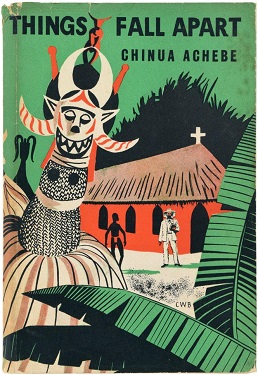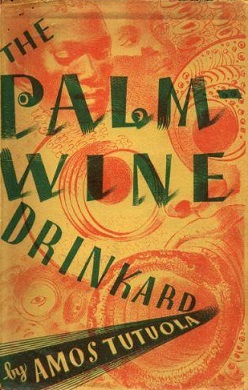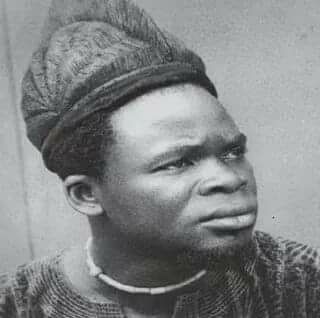
Akinwande Oluwole Babatunde Soyinka Hon. FRSL, known as Wole Soyinka, is a Nigerian playwright, novelist, poet, and essayist in the English language. He was awarded the 1986 Nobel Prize in Literature for his "wide cultural perspective and... poetic overtones fashioning the drama of existence", the first sub-Saharan African to be honoured in that category.

Things Fall Apart is the debut novel of Nigerian author Chinua Achebe first published in 1958. It depicts the events of pre-colonial life in Igboland and the subsequent appearance of European missionaries and colonial forces in the late 19th century. It is seen as an archetypal modern African novel in English, and one of the first novels to receive global critical acclaim. It is a staple book in schools throughout Africa and is widely studied in English-speaking countries around the world. The novel was first published in the United Kingdom in 1958 by William Heinemann Ltd and became the first work published in Heinemann's African Writers Series.

Sir Ben Golden Emuobowho Okri is a Nigerian-born British poet and novelist. Considered one of the foremost African authors in the postmodern and post-colonial traditions, Okri has been compared favourably to authors such as Salman Rushdie and Gabriel García Márquez. In 1991, his novel The Famished Road won the Booker Prize. Okri was knighted at the 2023 Birthday Honours for services to literature.
Kabelo Sello Duiker was a South African novelist. His debut novel, Thirteen Cents, won the 2001 Commonwealth Writers Prize for Best First Book, Africa Region. His second novel, The Quiet Violence of Dreams, won the 2002 Herman Charles Bosman Prize. He also worked in advertising and as a screenwriter.

Nigerian literature may be roughly defined as the literary writing by citizens of the nation of Nigeria for Nigerian readers, addressing Nigerian issues. This encompasses writers in a number of languages, including not only English but Igbo, Urhobo, Yoruba, and in the northern part of the county Hausa and Nupe. More broadly, it includes British Nigerians, Nigerian Americans and other members of the African diaspora.

Chief Daniel Olorunfẹmi Fágúnwà MBE, popularly known as D. O. Fágúnwà, was a Nigerian author of Yorùbá heritage who pioneered the Yorùbá language novel.

The Palm-Wine Drinkard is a novel published in 1952 by the Nigerian author Amos Tutuola. The first African novel published in English outside of Africa, this quest tale based on Yoruba folktales is written in a modified English or Pidgin English. In it, a man follows his brewer into the land of the dead, encountering many spirits and adventures. The novel has always been controversial, inspiring both admiration and contempt among Western and Nigerian critics, but has emerged as one of the most important texts in the African literary canon, translated into more than a dozen languages.
African literature is literature from Africa, either oral ("orature") or written in African and Afro-Asiatic languages. Examples of pre-colonial African literature can be traced back to at least the fourth century AD. The best-known is the Kebra Negast, or "Book of Kings" from the 14th century AD. Another well-known book is the Garima Gospels, one of the oldest known surviving bibles in the world, written in Ge'ez around 500 AD.
An ọgbanje is a term in Odinani for what was thought to be an evil spirit that would deliberately plague a family with misfortune. Belief in ọgbanje in Igboland is not as strong as it once was, although there are still some believers.

Durodola Durosomo Duroorike Timothy Adisa Ladipo, more commonly known as Duro Ladipo, was one of the best known and critically acclaimed Yoruba dramatists who emerged from postcolonial Africa. Writing solely in the Yoruba language, he captivated the symbolic spirit of Yoruba mythologies in his plays, which were later adapted to other media such as photography, television and cinema. His most famous play, Ọba kò so, a dramatization of the traditional Yoruba story of how Ṣango became the Orisha of Thunder, received international acclaim at the first Commonwealth Arts Festival in 1965 and on a Europe an tour, where a Berlin critic, Ulli Beier, compared Ladipọ to Karajan. Ladipo usually acted in his own plays.
Abiku is a Yoruba word that can be translated as "predestined to death". It is from (abi) "that which was born" and (iku) "death".
Oladipo Agboluaje is a British-Nigerian playwright. He was born in Hackney and educated in Britain and Nigeria, studying theatre arts at the University of Benin. He later wrote a doctoral thesis at the Open University on West and South African drama.

West African mythology is the body of myths of the people of West Africa. It consists of tales of various deities, beings, legendary creatures, heroes and folktales from various ethnic groups. Some of these myths traveled across the Atlantic during the period of the Trans-Atlantic slave trade to become part of Caribbean, African-American and Brazilian mythology.

Margaret Cezair-Thompson is a Jamaican writer, author of novels The True History of Paradise and The Pirate's Daughter, short stories, articles, and a screenplay about a female Jamaican athlete, Photo Finish, purchased by Oprah Winfrey (Harpo-Disney). Cezair-Thompson is a professor of literature and creative writing at Wellesley College.

Dangerous Love is a 1996 novel by Ben Okri set in Lagos of the 1970s. The novel is a remake of an earlier book, The Landscapes Within (1981). It is set in a post civil-war Nigerian society in a Lagos compound. Dangerous Love follows a young artist named Omovo and the influence that corrupt politics has on his artistry in the ghettos of Lagos in Nigeria after the Civil War.

Ghostlore is an intricate web of traditional beliefs and folklore surrounding ghosts and hauntings. Ghostlore has ingrained itself in the cultural fabric of societies worldwide. Defined by narratives often featuring apparitions of the deceased, ghostlore stands as a universal phenomenon, with roots extending deeply into human history.

Songs of Enchantment is a novel by Nigerian author Ben Okri, the second book in a trilogy that started with The Famished Road (1991) and continues with Infinite Riches (1998). It was published in London in 1993 by Doubleday.

Every Leaf a Hallelujah is an environment theme novel written by Nigerian-British writer Ben Okri and illustrated by Diana Ejaita. It was published in 2021 by Other Press (US) and Apollo (UK) in 2021.

Flowers and Shadows is a novel by Ben Okri.,a Nigerian author who won the Booker’s price award in 1991.The novel was set in Lagos. The novel portrays the realities of poverty and social lifestyle in Lagos. The protagonist, Jeffia, initially sheltered in wealth, confronts the darker aspects of his family's history and society's injustices. Themes of innocence versus experience, the legacy of family sins, and the resilience of hope amidst despair frequently appear throughout the novel. Through rich language and diverse characters, the novel explores the concept of beauty and brutality, ultimately offering a message of triumphant optimism despite society's shadows.
Infinite Riches is a novel by Nigerian writer Ben Okri, published in 1998. The spirit-child Azaro remains in the chaotic world of his African village, seeing the turbulent and fragile lives of the Living. These include his mother, who fights for justice, and his father, who is imprisoned for a crime he did not commit. The book is the third book of a trilogy which began with Famished Road in 1991.














